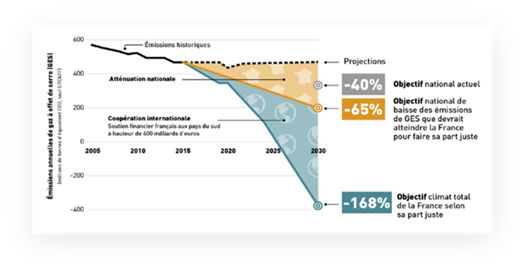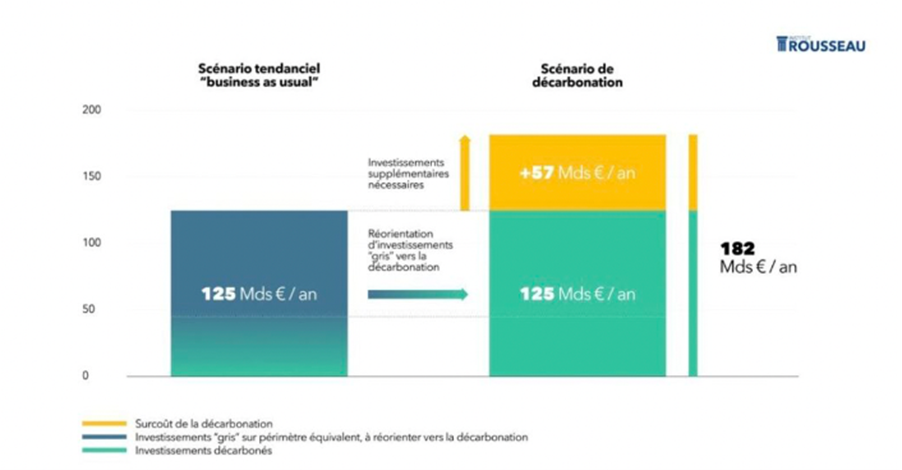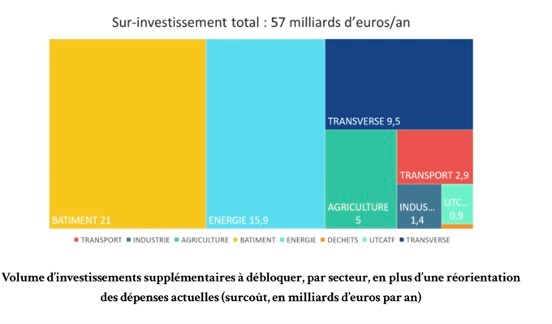
LIFE PROJECT Clinomics
28 November 2022
Selected aspects of EU climate action: Adaptation, trade & finance
5 December 2022By Marianne Mignot Ogliastri, Mathilde Poquillon, Ewald Waage
For the last century, GDP growth has strongly coincided with carbon emissions, meaning that rich countries have also been polluting the most, a phenomenon described as fossil capitalism by scholar Andreas Malm. As an example, France is the 5th richest country in the world,[1] and the 8th largest polluter.[2] Yet, it is far from being invulnerable to climate change.
Whilst its readiness score ranks it 12th out of 192 countries in 2021,[3] increased temperatures will threaten major sectors of French economy and agriculture, along with the provisioned decline of more than 80% of the EU’s farmland value by 2020.[4] Entire coastal areas are severely under threat from sea rise, representing 4.5 million people in 2021.[5] So what has France actually been doing to address climate change, and have these strategies proved effective?
National strategies and historical ambiguities regarding the energetic mix
In line with the Green Deal, France must reach net-zero greenhouse gas emissions by 2050, and reduce carbon emissions by at least 55% by 2030 compared to 1990 levels. However, whilst domestic emissions have decreased by 25% between 1995 and 2019, France’s carbon footprint has only risen, along with its import emissions (+72%).[6] On the global scale, the country ranks as a good student, producing relatively clean electricity thanks to its heavy dependence on the nuclear sector (around 70% of the total electricity production). Renewables, on the other hand, only represented 15.3% of the total energy share in 2018.[7] Both the attractivity and the dangers posed by such an energy source are at the heart of heated debates. This has led to ambiguous national policies over the years, characterized by often contradictory approaches: the dependence on nuclear was to be reduced from 50% by 2025, before Macron announced the construction of 6 new generation EPR reactors, making nuclear a key player of France’s environmental transition. It seems that France struggles to decide on which path to follow.
Efforts have clearly been made over decades: in only five years, France’s share of renewable energy has grown by 8%. In sectors such as transport, the country has strived towards more sustainable mobility, for example by decarbonizing public transport: Parisian buses should be 100% electric by 2025, and much thought has been put into incentivizing customers to buy electric vehicles by providing them with subsidies. On the legal level, France has developed a comprehensive legislative package composed of regulations and standards covering many sectors (such as biodiversity, wildlife and pollution) which resulted in several laws (Energy Law 2019), the Environmental Code or the Biodiversity framework law. Regulations have also been tightened up over the years, especially regarding the energy performance of buildings.
Despite national complaints about the lack of taxation, France’s environmental taxes represented nearly 52 billion euros in 2017.[8] The country has among the highest road fuel taxes in the OECD and around seven different taxes just concerning polluting activities.
A driving force of multilateral climate initiatives
France has been participating in global climate negotiations since the first Conference of Parties (COP) in Berlin in 1995. However, some less well-known French contributions to the fight against climate change include technical and financial support to sectoral or regional climate coalitions. These include:
- The NDC (Nationally Determined Contributions) Partnership, created at the COP 22 in 2016. The Partnership’s aim is for advanced economies to share information, expertise and funds to low- and middle-income countries to help them fulfill their NDC. Each country’s NDC was determined in 2015 in the Paris Agreement and determines how much they should reduce their CO2 emissions to maintain global temperatures under a 1.5°C increase.
- The International Solar Alliance (ISA), which aims at reducing the costs of solar energy to counter current fossil fuel dependency.
- The Africa Renewable Energy Initiative (AREI), with which advanced economies help African countries accelerate the harnessing of their continent’s huge renewable energy potential.
On top of these contributions, France also advocates for deeper collaboration within new innovative summits and coalitions. Sustainable finance is at the heart of the country’s efforts, with two summits created on the subject in the past five years: the One Planet Summit, directed mostly at the private sector, and the Finance in Common Summit, which gathers public development banks. The Agence Française du Développement (AFD) played an important role in the latter since it was the first public development bank to set a goal of 100% alignment with the Paris Agreement. Summits aside, France is also part of the OECD Paris collaborative on Green Budgeting, as well as the Green Bonds Principles Initiative, for green budgets and bond issuance.

Insufficiencies and critics: is France really doing enough?
Despite its variety, France’s climate action is not exempt from criticism. Réseau Action Climat (RAC), a French federation of associations against global warming, issued a report[9] last year calculating what each country’s ‘fair share’ of the Paris Agreement’s global effort to reduce GHG emissions should be, as per principles of historic equity and economic fairness. France being the eight biggest polluter since 1850 and the fifth richest country in the world in 2021, its fair share amounts to 2.6% of global emissions reduction, which would mean a national reduction of 168% by 2030. Since this is impossible, RAC advises France to reduce its emissions by 65%, instead of its current goal of 40%, and allocate 362 billion euros to developing countries to help them transition to a sustainable development model.
RAC scientists are of course aware that France does not have nearly 400 billion euros to spare; the aim of their numbers is to show the government that they can and must do more. Most importantly, they are changing the discourse on France’s international climate action: for now, it is implied that France, as an advanced economy, has the responsibility to help poorer countries transition. One must however remember that this wealth is related to the French – and European in general – historic responsibility and accountability in contributing to global warming since the second industrial revolution.
Bridging the financing gap
As has been seen with the SDG’s, the COP’s and the Green Deal, there is a fundamental gulf between climate objectives and the investments necessary to reach such environmental transitions. Director of Institut Rousseau Nicolas Dufrêne hence mentioned a relative “schizophrenia of public authorities”, characterized by committing to objectives they will not reach. The report ”2% for 2°”[10] by the Institute Rousseau takes a critical stance towards France’s climate action and proposes a complementary financing plan and alternative financing sources to drive the climate transition. It does not consider investment for biodiversity, water networks, soil pollution and emissions produced by imported products, which also have strong direct and indirect effects on climate and the environment. According to the report, 182 billions would be needed per year to finance the transition, which represents about 2,3% of France’s GDP in 2021. In addition to the 125 billion € already planned in a „trend scenario “, the report suggests that we need further 57 billion€ per year to achieve a “decarbonation scenario”.

Among these 57 billion €, 36 billion € would have to be provided by the public sector. To give an order of magnitude, in France, 38 billion € represent the repayments of interest on the public debt (2019), and 80-100 billion € is the estimation of annual fiscal fraud each year. The report aligns with the strategies of the Green Deal in the scope of sectors that need to be tackled to achieve a decarbonation of the economy. It proposes 76 concrete actions, such as enhancing carbon sinks by increasing the forest area and the resources allocated to its proper management, making greater use of the possibilities offered by public investment banks or to adapt initial training and education to the challenges of the ecological transition. According to the Institut Rousseau, the over-investment are needed foremost in the building and energy branch, in order to renovate, isolate, and improve the efficiency of the whole building sector. In short, climate transition is realistically achievable – but only with the means and investments needed to reach the set goals.

Conclusion
In sum, France is undeniably putting in some of the work necessary to reduce its carbon footprint and contribute to a more sustainable world. However, it is not doing nearly enough, as multiple associations and institutions keep reminding the government. Be it nationally or internationally, French efforts are insufficient to contain global warming under the critical 2°C increase – let alone the 1.5°C inscribed in the Paris Agreement.
But let us not cast the blame on France only: rather, the country is one of the many contributors to an international governmental reluctance to drastically change existing policies and rethink how we view and inhabit our world. The failures of COP 28 are just a further demonstration of this sad truth – that there are none so deaf as those who will not hear.
For our workshop, we had our classmates assess France’s climate action themselves. We had them stand in the shoes of Emmanuel Macron’s government, an activist climate association and the European Commission to imagine ways in which France’s climate action could become more efficient. Interestingly, the first decided to focus their policies on agriculture, the second on housing insulation and the third on energy – mainly pipelines.
Bibliography
Barroux, Rémi. “Avec Macron, Une Écologie Tournée Vers La Production et La Recherche Scientifique.” Le Monde.fr, October 27, 2022.
https://www.lemonde.fr/politique/article/2022/10/27/avec-macron-une-ecologie-tournee-vers-la-production-et-la-recherche-scientifique_6147489_823448.html.
Dubost, Léa. “Nucléaire : Un Projet de Loi Pour Accélérer La Construction de Nouveaux Réacteurs Dévoilé Ce Mercredi.” France Bleu, November 2, 2022.
https://www.francebleu.fr/infos/societe/nucleaire-un-projet-de-loi-pour-accelerer-la-construction-de-nouveaux-reacteurs-devoile-ce-mercredi-1667368312.
Global Climate Change Alliance. “Faire passer les CDN au niveau supérieur : de la théorie à la pratique.” GlobalClimateChangeAlliance.eu, January 4, 2021.
https://gcca.eu/fr/stories/faire-passer-les-cdn-au-niveau-superieur-de-la-theorie-la-pratique-0.
Garric, A. “La part de la France dans la lutte contre le changement climatique en question.” Le Monde.fr, February 3, 2022.
https://www.lemonde.fr/planete/article/2022/02/03/la-france-est-tres-loin-de-faire-sa-part-juste-dans-la-lutte-contre-le-changement-climatique_6112094_3244.html.
Lacroix, Valérie, and Edwin Zaccai. “Quarante Ans de Politique Environnementale En France : Évolutions, Avancées, Constante.” Revue Francaise d’Administration Publique 134, no. 2 (2013): 205–32.
https://www.cairn.info/revue-francaise-d-administration-publique-2010-2-page-205.htm.
Lee, Marvin. “France: Environmental Policies.” Earth.org – Past | Present | Future, November 8, 2021. https://earth.org/country/france/.
Commission de finance du sénat. ” Projet de loi finance 2021: Le budget de 2021 et son contexte économique et financier.” Sénat, 2021.
http://www.senat.fr/rap/l20-138-1/l20-138-115.html
Institut Rousseau. “2% pour 2°.” Institut-rousseau.fr, March 8, 2022.
https://institut-rousseau.fr/2-pour-2c-resume-executif/.
Ministère de l’Europe et des Affaires Etrangères. “L’action de la France dans les négociations climatiques.” Diplomatie.gouv.fr, October 2021.
https://www.diplomatie.gouv.fr/fr/politique-etrangere-de-la-france/climat-et-environnement/la-lutte-contre-les-changements-climatiques/les-negociations-internationales-en-matiere-de-lutte-contre-les-changements/article/l-action-de-la-france-dans-les-negociations-climatiques.
Ministère de l’Europe et des Affaires Etrangères. “Les négociations internationales en matière de lutte contre les changements climatiques.” Diplomatie.gouv.fr, December 2021. https://www.diplomatie.gouv.fr/fr/politique-etrangere-de-la-france/climat-et-environnement/la-lutte-contre-les-changements-climatiques/les-negociations-internationales-en-matiere-de-lutte-contre-les-changements/.
Ministère de la Transition Écologique. “L’empreinte Carbone de La France de 1995 à 2021.” Données et études statistiques pour le changement climatique, l’énergie, l’environnement, le logement, et les transports, November 4, 2022.
https://www.statistiques.developpement-durable.gouv.fr/lempreinte-carbone-de-la-france-de-1995-2021.
Ministère de la Transition Écologique. “Politiques de lutte contre le changement climatique des États : l’exemple de la France.” Données et études statistiques pour le changement climatique, l’énergie, l’environnement, le logement, et les transports, n.d.. https://www.statistiques.developpement-durable.gouv.fr/edition-numerique/chiffres-cles-du-climat/22-politiques-de-lutte-contre-le
NDC Partnership. “Accelerating Climate Action & NDC Implementation.” NDCpartnership.org, n.d.. https://ndcpartnership.org/.
OECD. “France | Integrating Environmental and Climate Action into Development Co-Operation : Reporting on DAC Members’ High-Level Meeting Commitments”. OECD ILibrary.org, n.d..
https://www.oecd-ilibrary.org/sites/a8959e8e-en/index.html?itemId=/content/component/a8959e8e-en.
Réseau Action Climat. “La France fait-elle sa part juste dans la réduction mondiale des gaz à effet de serre?” Réseau Action Climat.org, June 2, 2022.
https://reseauactionclimat.org/la-france-devrait-reduire-ses-emissions-de-168-dici-2030-selon-le-principe-dequite/.
Vie Publique. “Le financement de la lutte contre le changement climatique.” Vie-publique.fr, October 25, 2021.
https://www.vie-publique.fr/eclairage/19386-le-financement-de-la-lutte-contre-le-changement-climatique.
Vie Publique. “Les Politiques Environnementales En France à La Croisée Des Chemins.” Vie publique.fr, n.d.
https://www.vie-publique.fr/parole-dexpert/271812-les-politiques-environnementales-en-france-la-croisee-des-chemins.
[1] Réseau Action Climat. “La France fait-elle sa part juste dans la réduction mondiale des gaz à effet de serre?” Réseau Action Climat.org, June 2, 2022. https://reseauactionclimat.org/la-france-devrait-reduire-ses-emissions-de-168-dici-2030-selon-le-principe-dequite/.
[2] https://www.ucsusa.org/resources/each-countrys-share-co2-emissions
[3] University of Notre Dame, “Rankings: Notre Dame Global Adaptation Initiative,” Notre Dame Global Adaptation Initiative, 2020.
[4] “Climate Change Threatens Future of Farming in Europe,” European Environment Agency, 2019.
[5] Lumbroso, D., Stone, K. and F. Vinet, 2011. An assessment of flood emergency plans in England and Wales, France and the Netherlands. Natural Hazards 58: 341-363.
[6] Ministère de la Transition Écologique et de la Cohésion des Territoires, “Estimation de l’Empreinte Carbone de 1995 à 2019,” Données et études statistiques pour le changement climatique, l’énergie, l’environnement, le logement, et les transports, accessed November 28, 2022.
[7] Marvin Lee, “France: Environmental Policies,” Earth.Org – Past | Present | Future, November 8, 2021.
[8] Christophe Cassen and Jean Charles Hourcade, “Les Politiques Environnementales En France à La Croisée Des Chemins,” Vie publique.fr. Accessed 28/11/22.
[9] Réseau Action Climat. “La France fait-elle sa part juste dans la réduction mondiale des gaz à effet de serre?” Réseau Action Climat.org, June 2, 2022.
https://reseauactionclimat.org/la-france-devrait-reduire-ses-emissions-de-168-dici-2030-selon-le-principe-dequite/.
[10] Institut Rousseau. “2% pour 2°.” Institut-rousseau.fr, March 8, 2022. https://institut-rousseau.fr/2-pour-2c-resume-executif/.


